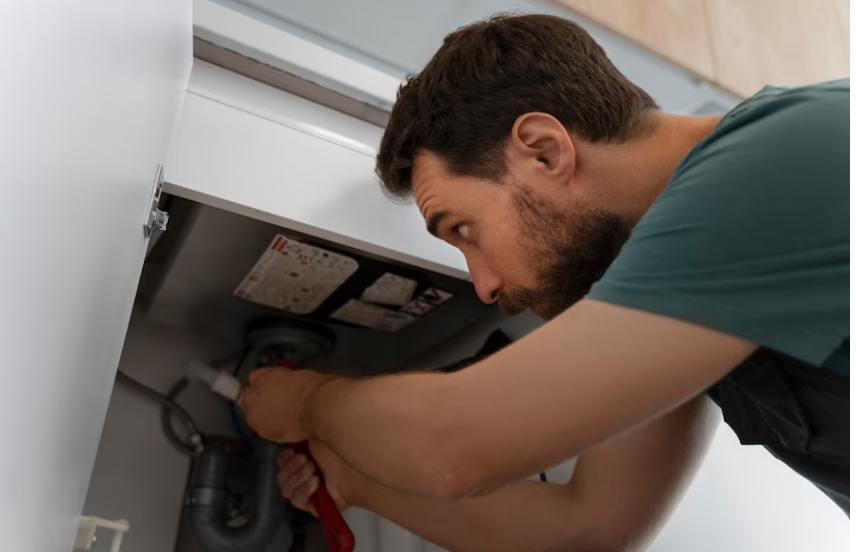Are you ignoring that pesky water heater leak? Don’t brush it off – it could lead to major consequences.
Mold and mildew can quickly take hold, putting your health at risk. Plus, there’s the danger of electrical hazards and potential fires.
And don’t forget about the potential for gas leaks, which can have catastrophic results.
Don’t wait any longer – quickly read below and address those leaks now, before they become costly problems.
The Hidden Threats of Water Damage
You should be aware of the hidden threats of water damage, such as mold growth and structural decay.
When water seeps into your home due to leaks or floods, it can create the perfect breeding ground for mold. Mold can spread rapidly, releasing spores into the air that can cause respiratory issues and allergies.
Not only that, but water damage can also lead to structural decay. The excess moisture weakens the foundation and framework of your home, compromising its stability. Over time, this can result in costly repairs and even collapse in extreme cases.
Ignoring water damage can have long-lasting consequences for your health and the integrity of your home. It’s best to address any signs of water damage promptly to prevent further harm.
10 Warning Signs That Your Water Heater is Leaking
What you should be looking for:
1. Puddles or water pooling around the base of the water heater.
2. Damp or wet spots on the floor, walls, or ceiling near the water heater.
3. Rust or corrosion on the water heater tank.
4. Decreased hot water supply or inconsistent water temperature.
5. Unusual noises coming from the water heater.
6. A noticeable increase in water bills without any other explanation.
7. The presence of a foul odor or strange taste in the hot water.
8. Visible signs of water damage, such as peeling paint or warped wood, near the water heater.
9. Mold or mildew growth in the vicinity of the water heater.
10. The water heater constantly running or cycling on and off more frequently than usual.
What Causes Hot Water Tanks to Leak?
There are several potential causes for water heater leaks:
Age and wear: Over time, the components of a water heater can deteriorate and develop leaks. This is especially true for older water heaters that may have corroded or weakened parts.
High water pressure: Excessive water pressure can put a strain on the water heater. If the pressure relief valve is faulty or not functioning correctly, it can lead to leaks.
Sediment buildup: Over time, minerals and sediment can accumulate at the bottom of the water heater tank. This buildup can corrode the tank and cause leaks.
Loose connections: If the connections between the water heater and the pipes are loose or not properly sealed, water can leak out.
Temperature and pressure relief valve (TPR valve) issues: The TPR valve is designed to release excess pressure and temperature from the water heater. If this valve is faulty or malfunctioning, it can cause leaks.
Overheating: If the water heater is set at too high of a temperature, it can cause the tank to overheat and develop leaks.
Physical damage: Any physical damage, such as a dent or crack in the tank, can lead to leaking.
It’s important to address water heater leaks as soon as possible to prevent further damage and potential hazards. Consulting with a professional water heater repair service is a good idea.
What Steps Can Be Taken To Prevent Water Heater Leaks?
To prevent water heater leaks, here are some steps you can take:
Regularly inspect your water heater: Check for any signs of leaks, rust, or corrosion. Look for damp spots or puddles around the base of the water heater.
Maintain your water heater: Follow the manufacturer’s instructions for maintenance, such as flushing the tank to remove sediment buildup. This can help prevent corrosion and leaks.
Check the pressure relief valve: Ensure that the pressure relief valve is working properly. If it is faulty, have it replaced immediately.
Monitor water pressure: Install a pressure regulator if your water pressure is consistently high. Excessive pressure can put strain on the water heater and cause leaks.
Insulate the pipes: Insulate the hot water pipes to prevent them from freezing and potentially causing damage to the water heater.
Address any plumbing issues promptly: If you notice any leaks or issues with the pipes connected to your water heater, have them repaired or replaced right away.
Set the temperature correctly: Avoid setting the water heater temperature too high, as this can cause overheating and potential leaks. Follow the recommended temperature settings provided by the manufacturer.
Consider a water leak detection system: Install a water leak detection system near your water heater. These systems can alert you to any leaks or water damage, allowing you to take immediate action.
By taking these preventive measures, you can reduce the risk of water heater leaks and minimize the potential damage they can cause. Regular maintenance and prompt repairs are essential to ensure the longevity and safety of your water heater.
What Happens When You Ignore Water Heater Leaks
When you ignore water heater leaks, several potential consequences can occur:
Water damage: The leak can lead to water damage in your home, causing damage to walls, floors, and furniture. This can be expensive to repair and may require professional assistance.
Mold growth: Moisture from the leak can create an ideal environment for mold growth. Mold can be harmful to your health and may require professional remediation.
Increased energy bills: A leaking water heater may be working harder to maintain the desired temperature, resulting in increased energy consumption and higher utility bills.
Reduced hot water supply: A leaking water heater can cause a decrease in the amount of hot water available for use. This can be inconvenient and impact your daily activities.
Rust and corrosion: The constant presence of water can lead to rust and corrosion in the water heater and surrounding pipes. This can ultimately lead to the failure of your water heater, requiring replacement.
Electrical hazards: If the water leak comes into contact with the electrical components of the water heater, it can create a safety hazard. Water and electricity can be a dangerous combination and may lead to electrical shocks or fires.
Health risks: Depending on the cause of the water heater leak, such as a faulty pressure relief valve or a buildup of sediment, there may be potential health risks. For example, sediment buildup can lead to bacterial growth, which can contaminate the water supply.
It is important to address any leaks promptly to prevent further damage and ensure the safe and efficient operation of your water heater.
The Costly Consequences of Delayed Repairs
You can save money in the long run by promptly fixing leaky pipes and preventing further damage. Ignoring and delaying repairs can have costly consequences.
Leaky pipes may seem like a minor issue, but they can lead to significant damage if left unaddressed. Water leakage can cause structural damage to your home, leading to expensive repairs and renovations. The constant dripping can also contribute to mold growth, which poses health risks and requires professional remediation.
Additionally, water wastage due to leaks can lead to higher water bills, further adding to your expenses. By taking immediate action and fixing leaky pipes, you can prevent these costly consequences and protect both your home and your wallet.
You also may consider switching to a tankless water heater.
Frequently Asked Questions
How Can I Detect Water Heater Leaks Before They Become a Major Problem?
Regularly inspecting your unit. Look for signs like puddles, rust, or unusual noises. Don’t ignore these warning signs.
Are There Any Warning Signs That Indicate a Potential Water Heater Leak?
Are there any warning signs that indicate a potential water heater leak?
Look out for:
– Puddles
– Rust or corrosion
– Strange noises
– Decrease in hot water supply.
What Steps Should I Take if I Suspect a Water Heater Leak in My Home?
If you suspect a water heater leak in your home, it’s important to take immediate action.
Turn off the power supply, shut off the water valve, and call a professional plumber to inspect and repair the issue.
Are There Any DIY Solutions for Fixing Minor Water Heater Leaks?
There aren’t any DIY solutions for fixing minor water heater leaks. Ignoring them can cause more damage and potential safety hazards.
It’s best to call a professional plumber to fix the problem.
Can Ignoring Water Heater Leaks Lead to Long-Term Structural Damage in My Home?
Ignoring water heater leaks can lead to long-term structural damage in your home. It’s important to address these leaks promptly to prevent further complications and ensure the safety and integrity of your property.
Conclusion
Ignoring water heater leaks can have serious consequences. From the hidden threats of water damage and the risk of mold and mildew growth to the dangers of electrical hazards and gas leaks, the potential risks are immense.
It’s crucial to address water heater leaks promptly to ensure your home’s safety and your family’s well-being.
Don’t take any chances, act now!







